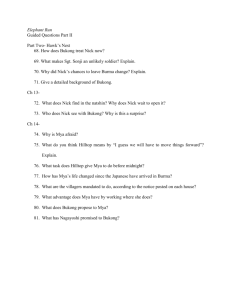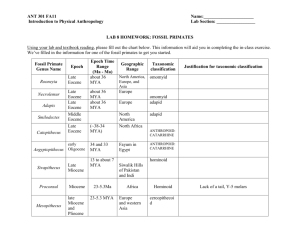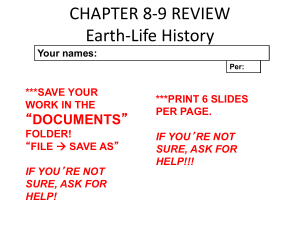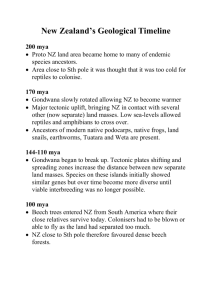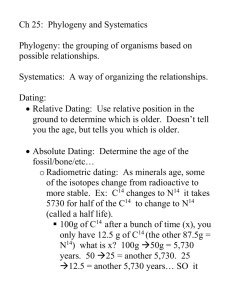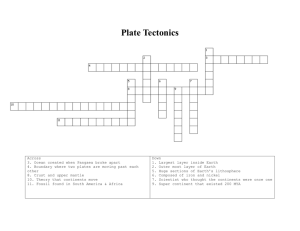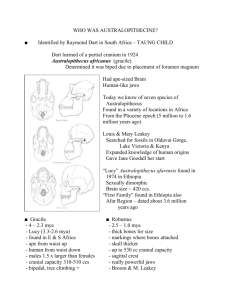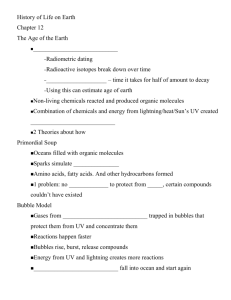ensiweb/lessons/pat.time. ppt
advertisement
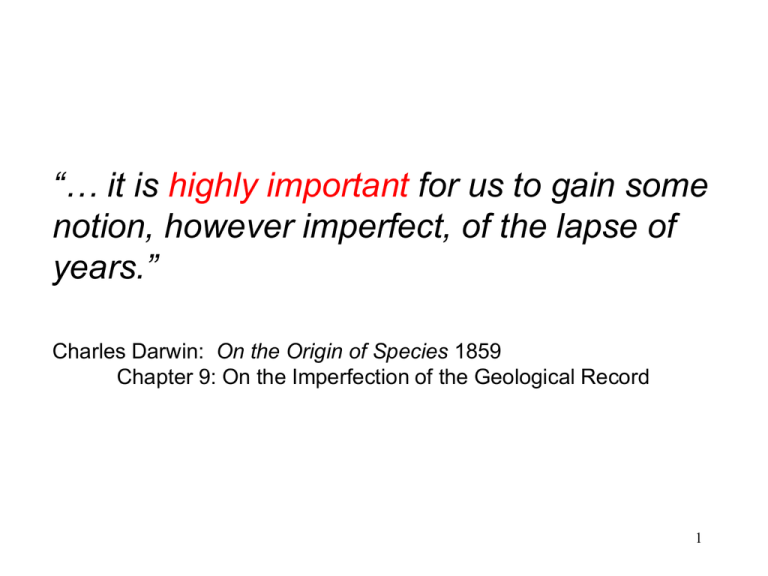
“… it is highly important for us to gain some notion, however imperfect, of the lapse of years.” Charles Darwin: On the Origin of Species 1859 Chapter 9: On the Imperfection of the Geological Record 1 3 Experience DEEP TIME… with its… PATTERNS of FOSSIL AGES and its PATTERNS of staggered ORIGINS 4 Trilobites Ferns Brachiopods 5 Ammonites Achaeopteryx Seymouria 6 When did they live? Long ago? How long? All at once? When? 7 Animals of the Past: Patterns in the Fossil Record Notice the origins… Notice the time… 8 What’s “65 mya” ? 65 millions of years ago How much is 65 mya? How much is ONE mya? How many human lifetimes is this? LET’S WORK IT OUT…. 9 Here’s One Month… 10 If each day is one inch long… 1” … how long is a week? …a month? … a year? 11 If ONE YEAR is 365 inches, how many feet is that? 365/12 = ~30 feet - or 10 YARDS 10 x 10 Yards = ? 100 Yards So… What’s 100 yards? Right! A FOOTBALL FIELD! Therefore, if 1 day = 1 inch, 10 years = 1 football field! 12 Looking 10 years - Back in Time! 13 IF… 1 day = 1 inch, 10 years = 1 football field! And a million years would be… 5,700 miles! Can you VISUALIZE THAT? 14 Not easily… So, let’s try a different scale… Let’s take 10 years of your life, and reduce it to 1 millimeter! 15 If you do this, 1 football field would equal 1 million years! 16 …and hundreds of millions of years are much easier to visualize Let’s try this… 17 You can plot 100s of millions of years on a map of your local area… For example, 500 mya would only be about 30 miles away 18 …or plot billions of years within your state the past 500 million years the past 4.6 billion years 19 All of this in fairly familiar territory… When you shrink 10 years of your life into one tiny millimeter… 20 a million years equals a football field! 21 So 500 million years would be about 30 miles away… And 50 million years would be about 3 miles away 22 LET’S DO IT! Calculating distances for mya: • • • • • • • If 1 mm = 10 yrs, then 1 fbf = 1 mya x1000: 1000 mm (= 1 meter) = 10,000 yrs x100: 100 meters = 1,000,000 yrs = 1 mya 1 meter ≈ 1 yard, so… 100 m ≈ 100 yards = 1 football field = 1 mya x10: 10 fbf = 1000 meters = 1 km = 10 mya 10 mya = 1 km = 0.6 mile 23 Calculating distances for mya… Continued… • 10 mya = 1 km = 0.6 mile • So 100 mya = 6 miles so… 6 miles = 1 100 mya • So… Desired Distance = 6 miles for Desired Time 100 mya • SO… DD = DT x 0.06 • Example: If DT is 65 mya: DD = 65 x 0.06 DD = 3.9 miles • OR… Use the table provided! 24 Geolgical Time Scale FBF km mi mya mi cm 25 Finding MAP Distance on Map Find the map scale: Measure its length: 5 mi 1.9 cm So, on this map, 1.9 cm = 5 miles Map Distance = 1.9 cm Desired Dist. 5 mi OR… MD = DD x 0.38 Example: If Desired Distance is 13.2 mi., MD = 13.2 x 0.38 = 5.02 cm 26 Or… Check the Geolgical Time Scale This Map Scale: 5 mi = 1.9 cm FBF km mi mya mi cm 27 And plot that Map Distance as the radius of a circle or arc centered from your school… 13.2 miles ≈ 5 cm (for 220 mya) or distance from SJSU to Cupertino! 28 Now, when you see the 10s of millions of years that separate the origins of the different classes of vertebrates, 29 you will have a much better sense of the vastness of that time. 30 Your Own Vertebrate Timeline In order to get more familiar with those vertebrate classes, and when their first fossils appeared, You may be asked to make your very own “Chronology of Fossil Vertebrates” 31 You will use this chart showing basic vertebrate traits for all the groups… PLUS a set of distinct new modifications New Traits, added when each new group appears… 32 Chronology of Fossil Vertebrates On this timeline grid, mark when the first fossils for each class appeared, starting at the lower left, and shifting to the right with each class as shown here… 33 Chronology of Fossil Vertebrates Now label each of those first fossils, along with their additional traits Notice how many millions of years between the beginnings of each group… 34 Chronology of Fossil Vertebrates Then draw vertical lines from each “first fossil” up to the top line that represents “NOW” (except for the Pre-mammals, that became extinct about 60 mya), and LABEL EACH. 35 ADDED FEATURES: You could vary the thickness of each line to show relative diversity in each group through time, and/or, you could find and add pictures of typical members of each group. Or, make a larger version - for the wall 36 Notice, by the way, that each class has the same traits as the previous class… PLUS a set of distinct new modifications that are unique to each new class… 37 We ALSO find many fossils showing gradual transitions from class to class… fish to amphibian… X X X Tiktaalik - fish with wrist bones! 38 Transitions from pre-mammal to mammal… Early Mammals Early Pre-Mammals 39 Transitions from pre-whales to whales… with hippos as their closest living cousins! 40 Transitions from pre-humans to humans… 41 THIS all suggests a biological connectedness… LIKE THIS… 42 And what is this biological connectedness called? Right….EVOLUTION! 43 Did this experience give you a better sense of geological time? Did this experience reveal patterns of fossils that you didn’t realize before? 44 I hope you enjoyed these… 45 Appendix: Geological Time Scales 46 Geological Ages - 2004 47 Geological Time - Over Time (since 1937) The next 2 slides show how the increased precision of radiometric dating over the years has stabalized the timing for the major geological periods - with little change since 1990… 48 Geological Time - Over Time (since 1937) PALEOZOIC MESOZOIC 1990 49 Geological Time - Over Time (since 1937) CENOZOIC 50 LOOKING FOR TEACHERS TO BETA-TEST PATTERNS IN TIME on the ENSI website All levels - 5th through college Try it, and please send me your feedback 51
